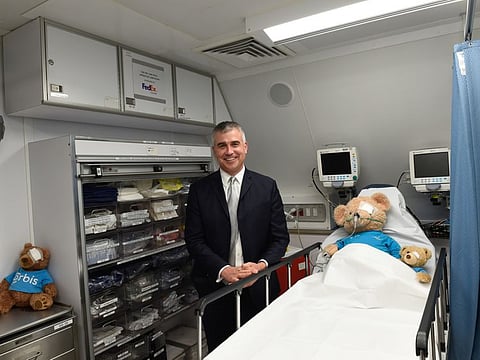Watch: World’s only flying eye hospital on a goodwill visit to Dubai with a message
With 40 years of teaching, treating across world, Orbis asks UAE diabetics to screen eyes

Dubai: Orbis, the world’s only flying hospital battling blindness and saving sight, is on a goodwill visit to Dubai with a message for people of the UAE.
After 40 years of teaching and treating across world, Orbis wants to ask diabetics in the UAE to screen their eyes and prevent diabetic retinopathy, a leading cause of blindness and vision loss in adults between 35-50.
Founded in 1973, Orbis International has successfully carried out sight-saving programmes in countries across the globe. It was in March, 1982, when the iconic Flying Eye Hospital took off on its first ever sight-saving project on a DC8 flight. Over the four decades, the non-profit organisation has covered around 95 countries and is now functioning on board a third generation MD-10 aircraft donated by FEDEX.
When it is celebrating 40 years of preventing blindness, Orbis, supported by Omega since 2011, has paid a goodwill visit to Dubai to thank its partners here and also spread awareness about diabetic retinopathy, one of the major causes of vision loss in this region.
“Dubai is one of our strongest partners,” Dr Hunter Cherwek, vice president, clinical services and technologies at Orbis, told Gulf News on board the flying hospital aircraft parked at Al Maktoum International Airport on Thursday.
“We have had many year partnerships with the Executive Office and with the airport. It’s strong with our restock and supplies … The airport, the engineers, everything here helps us do our mission. So it really is like coming home,” he said.
“Also one of the things I love about Dubai is you help us get the message out. I don’t think a lot of people realise that. For example, in the Gulf region, there’s an epidemic of diabetes. And the most important thing a diabetic can do is check their eyes. So we can use this opportunity with a conversation with you all to educate more and more people and Dubai is such a wonderful platform for that.”
Why it is important
The message comes just ahead of the World Diabetes Day observed with various awareness activities on November 14.
Almost one in five adults in the UAE have diabetes with around 19 per cent of the population suffering from the chronic illness. The UAE is ranked 10th-highest in the world for diabetes prevalence and the number of people with diabetes is expected to double to 2.2 million by 2040.
Check diabetes through eyes in 7 seconds
Dr Cherwek said the mission of Orbis is to democratise and globalise education and technology.
He said doctors in the UAE and across the world can make use of “the world’s largest freely available online library for doctors and nurses and anaesthesiologist from Orbis called Cyber Sight.”
“We also have the world’s first Artificial Intelligence system that can allow any doctor in the world to screen the pictures of the retina for diabetes for free. So in seven seconds, I can tell you if the patient has diabetes,” said Dr Cherwek.
Cyber Sight App
He said doctors can access the AI system through the newly launched Cyber Sight app or its website after registering for free. The organisation has done its first ever clinical trial showing how Artificial Intelligence improves patients’ compliance in Rwanda in eastern Africa.
“If you were found to have diabetes in the rural parts of Rwanda with AI, you’re much more likely to come to the hospital and get treated. All of us know a stitch in time will save nine. The earlier you get your treatment, you can avoid surgery, vision loss, things like that,” Dr Cherwek pointed out.
Orbis features a state-of-the-art, fully accredited eye hospital with technology that can transmit live surgeries around the world in 3D so that other eye care teams can learn from them. The Flying Eye Hospital not only provides a platform to train doctors, nurses, and other eye care professionals, but also serves as a powerful symbol for raising awareness, creating change, and bringing local governments and global organisations, major donors, and everyday people together in the global fight to end avoidable blindness.
“There are one billion people living with avoidable sight loss and that’s where Orbis comes in. We’ve done over 52,000 trainings so far to help fight preventable blindness,” said Derek W. Hodkey, president and CEO of Orbis.
Sign up for the Daily Briefing
Get the latest news and updates straight to your inbox

